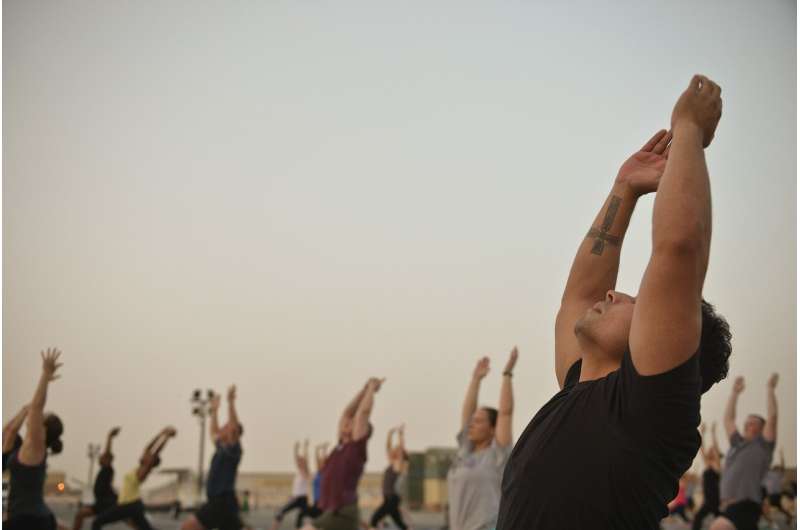Study confirms the positive effect of yoga on prison inmates

A new study strengthens previous results on the positive effect of yoga on prison inmates. In this study, inmates' character maturity across several dimensions increased after 10 weeks of yoga. Those who participated in yoga classes reported an increased sense of responsibility, self-acceptance and control of their behaviors.
"It is possible that a mature character can reduce the risk of reoffending, but it needs further investigation," says Nóra Kerekes, professor of medical science (psychiatry) at the University West, Sweden.
In recent years, research has shown that regular yoga provides positive effects on inmates' mental health and behavior.
"What we have seen earlier in our studies is that yoga practice is associated with decreased level of psychological distress, attenuation of antisocial behaviors and increased level of positive affect, impulse control and sustained attention. Now, we wanted to take it one step further and investigate whether these behavioral, emotional and cognitive changes could be measured in terms of character maturity," says Nóra Kerekes.
10 weeks of yoga practice
More than 100 male inmates participated in the 10-week study. They were randomly assigned into a yoga group in which they had once-a-week yoga classes, or to a control group in which they could exercise free choice of physical activity. The participants completed a personality test called the Temperament and Character Inventory before and after the 10 weeks of the intervention period.
Specific personality profile of inmates
According to previous research, prison inmates have a specific personality profile, described by high scores in the temperament dimensions of novelty seeking (impulsivity and irritability), and harm avoidance (pessimism and anxiety), combined with low scores in the character dimensions of self- directedness (blaming and incompetence) and cooperativeness (hostility and self-centeredness). This specific personality profile is highly correlated with aggressive and antisocial behavior.
Decreased impulsivity and irritability
The analyses of the personality tests showed that inmates who regularly perform some type of physical activity (yoga or free choice of physical activity) after 10 weeks scored lower in the temperament dimension of novelty seeking.
"Individuals who have high scores on novelty seeking are described as impulsive, exploratory, unstable and irritable. They are easily attracted to new interests and activities, but also easily distracted and bored. This is, in itself, not negative, but among criminals, this often means that they are looking for excitement that leads to norm- and rule-breaking behaviors," says Nóra Kerekes.
Worrying less
The result also showed significantly lower scores in both groups on the temperament dimension of harm avoidance.
"People who have high scores in harm avoidance are afraid of conflicts, they shield themselves and often avoid other people, and they worry and are pessimistic. The study showed that these characteristics decreased more among those who participated in yoga," says Nóra Kerekes.
Increased self-control in the yoga group
The most important result was, however, that those who practiced yoga had a significant increase in the character dimension of self-directedness.
"Increased scores in self-directedness suggest increased self-control over emotional drives, increased responsibility and resourcefulness. According to our study, regular yoga can increase these traits. In other words, it can increase the person's character maturity," says Nóra Kerekes.
The significance of character maturity
Nóra Kerekes emphasizes the importance of the finding, suggesting significant changes in inmates' character maturity as a result of regular yoga practice.
"One can regulate, for example, impulsive behaviors with different pharmacological interventions, but an increased character maturity suggests personal capacity to handle and overcome both external and internal difficulties, including the control over mental reaction patterns, abilities and drives."
Nóra Kerekes concludes, "Future research should further investigate whether an increased character maturity can result in long-lasting positive changes in the inmates' behaviors and mental health. Such changes may possibly reduce the risk of reoffending, and also support prison inmates' re-integration into the society after release."
More information: Nóra Kerekes et al. Imprisoning Yoga: Yoga Practice May Increase the Character Maturity of Male Prison Inmates, Frontiers in Psychiatry (2019). DOI: 10.3389/fpsyt.2019.00406















